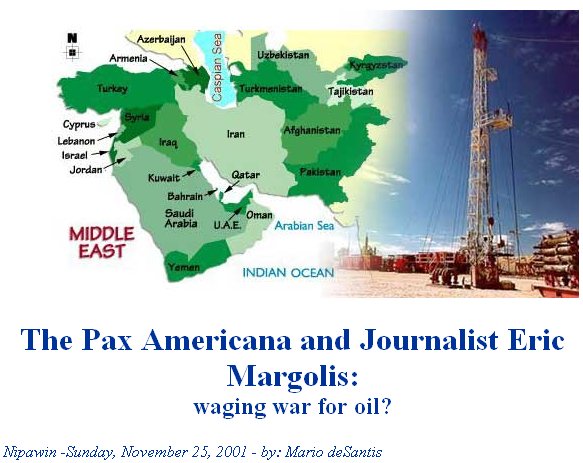Learning Stories
by
Mario deSantis
mariodesantis@hotmail.com
“I am a Canadian, free to speak without fear, free to worship in my own way, free to stand for what I think right, free to oppose what I believe wrong, and free to choose those who shall govern my country.” - -The Rt. Hon. John Diefenbaker, Canadian Bill of Rights, 1960
“The whole judicial system is at issue, it's worth more than one person.”--Serge Kujawa, Saskatchewan Crown Prosecutor, 1991
“The system is not more worth than one person's rights.”--Mario deSantis, 2002
Ensign Stories © Mario deSantis and Ensign
|
|
"It would be some time before I fully realized that the United States sees little need for diplomacy. Power is enough. Only the weak rely on diplomacy ... The Roman Empire had no need for diplomacy. Nor does the United States."-- Boutros Boutros-Ghali, former Secretary General of the United Nations We have been saying sometime ago that the language used by President George Bush is not a language of peace but a language of war. We must understand that this war mentality is entrenched in the world view of political, economic and media leadership. From a conceptual point of view, I have been saying that as long as the United States or any other country in the world uses the accepted understanding of the terms "status quo" or "ceteris paribus" or "geopolitics" or "quid pro quo" in their foreign relations then we are doomed to make wars to make peace in an unending cycle. We have been mentioning that President George Bush and Vice-President Dick Cheney are people who made their fortune in the oil industry, and we also understand that President Bush has links with the Carlyle Group, the world's largest private equity firm dealing with defense and aerospace. When we consider that the United States is far ahead of any other country in military spending and that it is still spending more in the military industry while experiencing a foreign trade deficit then the overall picture of the world peace is very scary. We can reach a conclusion that peace is a condition of waging wars, that the United States' willingness to pursue peace is conditional to its willingness to wage wars in some 50 countries harboring terrorists, that the Free Market is defended with military power, that oil supplies are defended by waging wars. Journalist Eric Margolis writes today in the Toronto Star that the United States went to war with Afghanistan for Central Asian oil and gas as well as for defending their western values from the evildoers. I want to provide the following excerpt of Margolis' article so that we can have a critical understanding of our political events rather than digest the usual whitewashing coverage of these events by the big media corporations. Margolis writes:
So this is all about, controlling energy, controlling people, controlling the globe, controlling nature. This is not the way things should be, as we can have and share more renewable energy resources rather than build our economies on oil, we can unleash people's creativity and good will rather than having people controlled by either big corporation or the military, we can share the globe rather than dividing the globe between the North and South, we can live with nature rather than having our big corporations manufacturing life and controlling nature. We need a change of world view away from the current world view of "status quo" or "ceteris paribus" or "geopolitics" or "quid pro quo." References Pertinent reference published in Ensign Putin's the big winner in Bush's war. Did the United States go to war with Afghanistan for Central Asian oil and gas? By Eric Margolis, Contributing Foreign Editor, The Toronto Star, November 25, 2001 Using the language of war rather than the language of peace: Do we need a star war to fight the evil-doers? By Mario deSantis, October 22, 2001 War on Terrorism: a shorter version of the Pax Romana? By Mario deSantis, October 17, 2001 Slicking the Free Market with Oil and Defending it with Arms: The Carlyle Group and the Company of Friends, by Mario deSantis, November 7, 2001 The economics of Dean Baker and Paul Krugman versus the economics of George Bush and Donald Rumsfeld, by Mario deSantis, November 20, 2001 |
